课程标准HSK一级语法点
课程实用标准HSK一级语法点
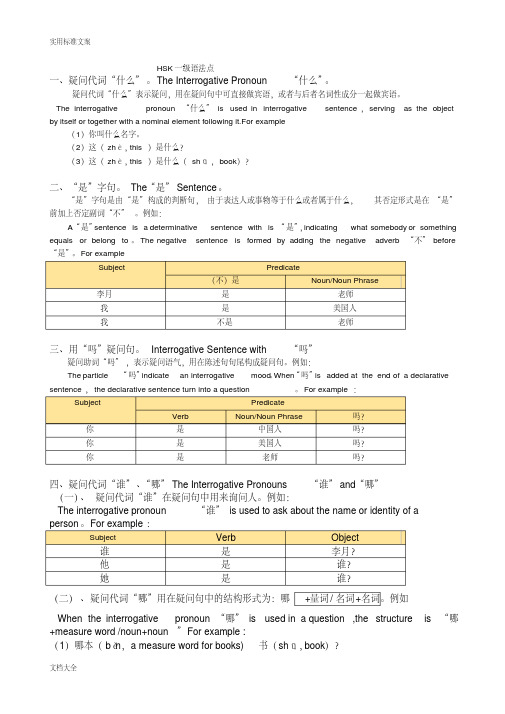
“呢”(1)
疑问助词“呢”用在名词后或代词后构成疑问句,用于询问上文提到的情况。常用的句式
是: A.......... 。B 呢?例如:
The Interrogative particle “呢”is used after a noun or pronoun ,forming a question about the situation mentioned previously .The commonly used sentence pattern is “A....... 。 B 呢?” (A...... 。What about B).For example:
is “哪
文档大全
实用标准文案
(2)哪个( gè,a general measure word )人? (3)你是哪国人?
五、结构助词“的” The structural particle
“的”
名词 / 代词 +的 +名词表达一种所属关系。当“的”后的名词是亲属称谓或者指人的名词时 ,
“的”可以省略。例如: The structure “ noun/pronoun+ 的 +noun”indicate possession.When the noun following
“是”字句是由“是”构成的判断句, 由于表达人或事物等于什么或者属于什么,
其否定形式是在 “是”
前加上否定副词“不” 。例如:
A“是”sentence is a determinative sentence with is “ 是”,indicating what somebody or something
by itself or together with a nominal element following it.For example
新HSK一级词汇和语法
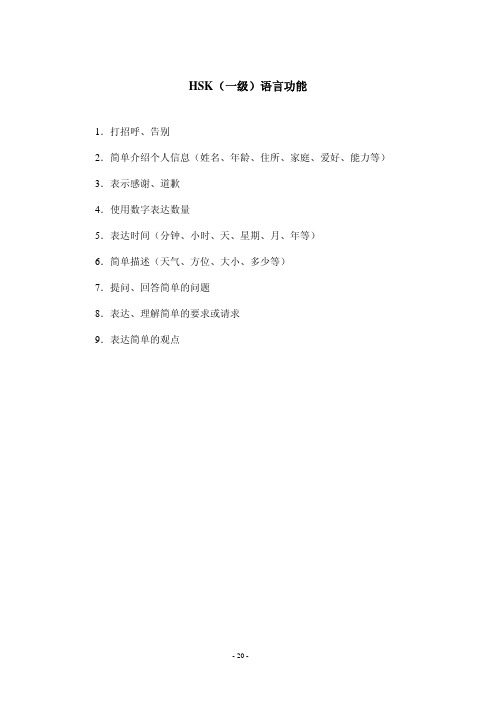
医生 先生 小姐
lǎoshī
老师
xuésheng
学生
tóngxué
同学
péngyou
朋友
yīfu shuǐ cài mǐfàn shuǐguǒ píngguǒ
(5)衣服 水 菜 米饭 水果 苹果
chūzūchē diànshì diànnǎo diànyǐng tiānqì
- 23 -
gōngzuò
32. 工作
gǒu
33. 狗
H
Hànyǔ
34. 汉语
hǎo
35. 好
hē
36. 喝
hé
37. 和
hěn
38. 很
hòumian
39. 后面
huí
40. 回
huì
41. 会
huǒchēzhàn
42. 火车站
J
jǐ
43. 几
jiā
44. 家
jiào
45. 叫
jīntiān
46. 今天
Wǒ bú shì xuésheng
我 不 是 学生 。
Tā méi qù yīyuàn
他 没 去 医院 。
- 26 -
(2)程度副词(很、太)
(3)范围副词(都) 5.连词 和 6.介词 在 7.助动词 会、能
8.助词 (1)结构助词(的) (2)语气助词(了、吗、呢)
9.陈述句 (1)肯定句
① “是”字句 ② “有”字句 ③ 名词谓语句 ④ 动词谓语句 ⑤ 形容词谓语句
出租车 电视 电脑 电影 天气
chá bēizi
茶 杯子
māo gǒu
猫狗
课程标准HSK一级语法点
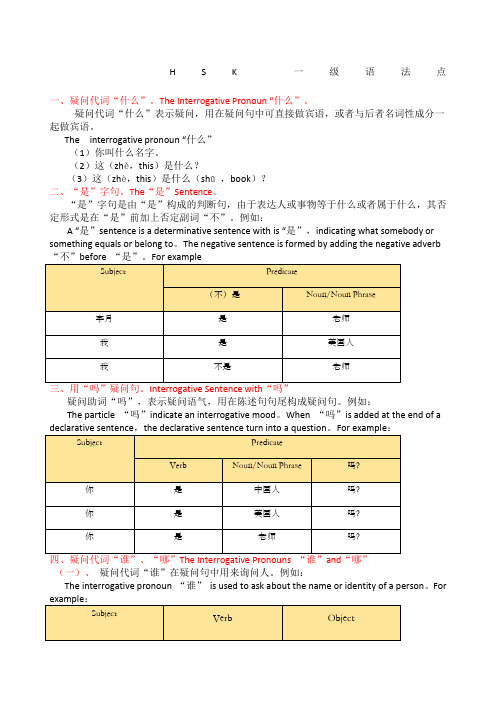
H S K一级语法点一、疑问代词“什么”。
The Interrogative Pronoun “什么”。
疑问代词“什么”表示疑问,用在疑问句中可直接做宾语,或者与后者名词性成分一起做宾语。
The interrogative pronoun “什么”(1)你叫什么名字。
(2)这(zhè,this)是什么?(3)这(zhè,this)是什么(shū,book)?二、“是”字句。
The“是”Sentence。
“是”字句是由“是”构成的判断句,由于表达人或事物等于什么或者属于什么,其否定形式是在“是”前加上否定副词“不”。
例如:A “是”sentence is a determinative sentence with is “是”,indicating what somebody or something equals or belong to。
The negative sentence is formed by adding the negative adverb疑问助词“吗”,表示疑问语气,用在陈述句句尾构成疑问句。
例如:The particle “吗”indicate an interrogative mood。
When “吗”is added at the end of a(一)、疑问代词“谁”在疑问句中用来询问人。
例如:The interrogative pronoun “谁”is used to ask about the name or identity of a person。
For(二)、When the interrogative pronoun “哪” is used in a question ,the structure is “哪+measure word /noun+noun ”For example :(1)哪本(běn,a measure word for books)书(shū,book)?(2)哪个(gè,a general measure word )人?(3)你是哪国人?五、结构助词“的”The structural particle“的”当“的”后的名词是亲属称谓或者指人的名词时,“的”可以省略。
hsk1级语法点

hsk1级语法点【原创实用版】目录1.什么是 HSK1 级语法点2.HSK1 级语法点的重要性3.常见的 HSK1 级语法点4.学习 HSK1 级语法点的方法正文HSK1 级语法点是指在汉语水平考试(HSK)一级测试中,需要考生掌握的基本汉语语法知识。
HSK 是评估非母语者汉语水平的一项重要考试,分为 HSK1 至 HSK6 六个等级,其中 HSK1 级是最基础的级别。
对于初学者来说,熟练掌握 HSK1 级语法点是学习汉语的关键一步。
HSK1 级语法点的重要性体现在以下几个方面:首先,它是汉语学习的基础,只有掌握了基本的语法规则,才能准确地表达思想和理解他人的表达。
其次,它是 HSK 考试的基础,HSK1 级语法点是 HSK1 级考试的重点内容,对于考生来说,掌握这些语法点是顺利通过考试的必要条件。
最后,它也是进一步学习汉语的基石,只有打好基础,才能在更高级别的汉语学习中取得更好的效果。
常见的 HSK1 级语法点包括:1.汉语的词类,如名词、动词、形容词等;2.词的语法功能,如主语、谓语、宾语等;3.句子成分,如主语、谓语、宾语等;4.句子结构,如主谓宾句、主谓状句等;5.词语的搭配,如动词和宾语的搭配等。
对于这些语法点,学习者需要通过大量的练习,熟悉其用法,并能在实际应用中灵活运用。
学习 HSK1 级语法点的方法主要有以下几种:首先,可以通过阅读教材和参考书,系统地学习语法知识;其次,可以通过做练习题和模拟试题,检验自己的学习效果,并及时发现自己的不足;最后,可以通过与母语为汉语的人进行交流,提高自己的口语表达能力,并在实际应用中熟悉语法规则。
总的来说,HSK1 级语法点是学习汉语的基础,对于初学者来说,掌握这些语法知识是提高汉语水平的关键。
HSK1 语法
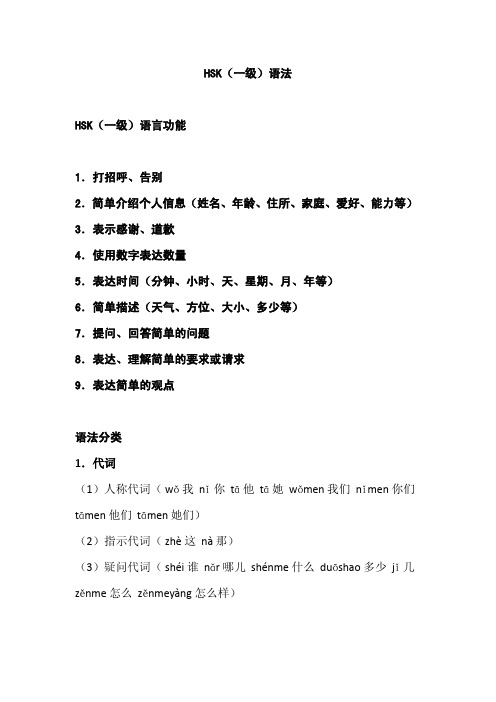
HSK(一级)语法HSK(一级)语言功能1.打招呼、告别2.简单介绍个人信息(姓名、年龄、住所、家庭、爱好、能力等)3.表示感谢、道歉4.使用数字表达数量5.表达时间(分钟、小时、天、星期、月、年等)6.简单描述(天气、方位、大小、多少等)7.提问、回答简单的问题8.表达、理解简单的要求或请求9.表达简单的观点语法分类1.代词(1)人称代词(wǒ我nǐ你tā他tā她wǒmen我们nǐmen你们tāmen他们tāmen她们)(2)指示代词(zhè这nà那)(3)疑问代词(shéi谁nǎr哪儿shénme什么duōshao多少jǐ几zěnme怎么zěnmeyàng怎么样)2.数词(1)表示时间8diǎn点40fēn分2009nián年7yuè月7rì日xīngqīsì星期四(2)表示年龄Tā他jīnnián今年24suì岁。
(3)表示钱数15kuài块(4)表示号码Wǒ我de的diànhuà电话shì是58590000。
3.量词(1)用在数词后yí一ge个3běn本(2)用在“这”“那”“几”后zhège这个nàxiē那些jǐ几cì次4.副词(1)否定副词(不、没)Wǒ我bú不shì是xuésheng学生。
Tā他méi没qù去yīyuàn医院。
(2)程度副词(很、太)Tā她hěn很gāo xìng高兴。
Tài太hǎo好le了!(3)范围副词(都)Wǒmen我们dōu都kànjiàn看见nàge那个rén人le了。
5.连词(和)wǒ我hé和nǐ你6.介词(在)Wǒ我zhù住zài在Běijīng北京。
HSK考试 语法 第一课

1、正好
“正好”,可以做形容词,正合适,表示(时间、位 置、数量、程度等)满足某个条件(不早不晚、不前 不后、不大不小、不多不少、不高不低等)。例如: “正好” can be used as an adjective to mean "just right",indicating a certain condition (in terms of time,position,size,quantity or degee,etc.)is met(i.e.,it is neither too erly no too late,neither before nor after,neither too big nor too small,neither too much nor too little,neither too high nor too low,etc.).For example:
(去,可惜票早就卖光了。
A : __________________ ,到时候一起去吧。 (正好)
Thank
you
(4) 我妹妹出生那天,正好下雪,所以爸爸妈妈叫她 “小雪”。
练一练 Practice
完成句子或对话 Complete the sentences/dialogues. (1)李老师来了,_______________________ 。(正好)
(2)A:今天开回来了多少人?
B:____________________________。(正好)
【例】
(1)苹果八块五,西瓜十一块五,正好二十块钱。
表示:正合适,不多不少。 不需要找零,整整好好 二十块钱整。
HSK一级词汇与语法解析
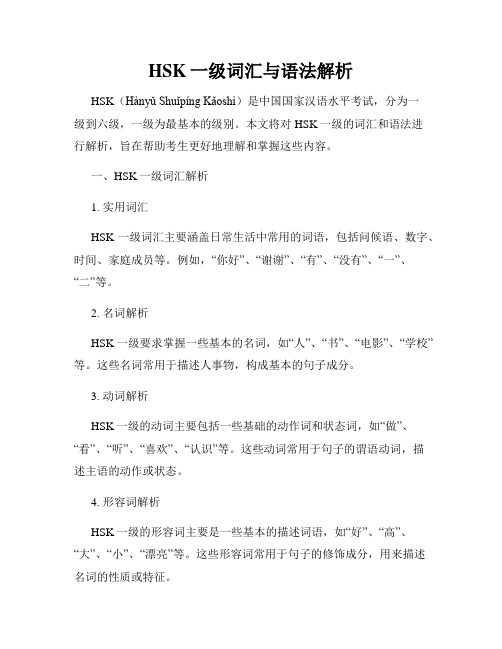
HSK一级词汇与语法解析HSK(Hànyǔ Shuǐpíng Kǎoshì)是中国国家汉语水平考试,分为一级到六级,一级为最基本的级别。
本文将对HSK一级的词汇和语法进行解析,旨在帮助考生更好地理解和掌握这些内容。
一、HSK一级词汇解析1. 实用词汇HSK一级词汇主要涵盖日常生活中常用的词语,包括问候语、数字、时间、家庭成员等。
例如,“你好”、“谢谢”、“有”、“没有”、“一”、“二”等。
2. 名词解析HSK一级要求掌握一些基本的名词,如“人”、“书”、“电影”、“学校”等。
这些名词常用于描述人事物,构成基本的句子成分。
3. 动词解析HSK一级的动词主要包括一些基础的动作词和状态词,如“做”、“看”、“听”、“喜欢”、“认识”等。
这些动词常用于句子的谓语动词,描述主语的动作或状态。
4. 形容词解析HSK一级的形容词主要是一些基本的描述词语,如“好”、“高”、“大”、“小”、“漂亮”等。
这些形容词常用于句子的修饰成分,用来描述名词的性质或特征。
二、HSK一级语法解析1. 代词的使用HSK一级要求学习使用一些基本的代词,如“我”、“你”、“他”、“她”、“这”、“那”等。
代词在句子中代替特定的名词,简化语言表达。
2. 助词的运用HSK一级需要学习一些基本的助词,如“的”、“了”、“吗”、“不”等。
助词在句子中起到连接和修饰的作用,增强语言的表达能力。
3. 时态与语序HSK一级要求掌握一些基本的时态和语序。
汉语的语序为主谓宾,时态有过去、现在和将来三种。
例如,“我昨天去了学校”、“她喜欢看电影”。
4. 介词短语的运用HSK一级需要学习一些常用的介词短语,如“在...里面”、“从...到...”、“对...有兴趣”等。
介词短语可以表达时间、地点、方向等概念。
总结:HSK一级的词汇和语法是学习汉语的基础,通过对这些内容的解析,考生可以更好地理解和运用。
词汇是汉语表达的基础,语法则是句子构建的规则。
hsk语法等级
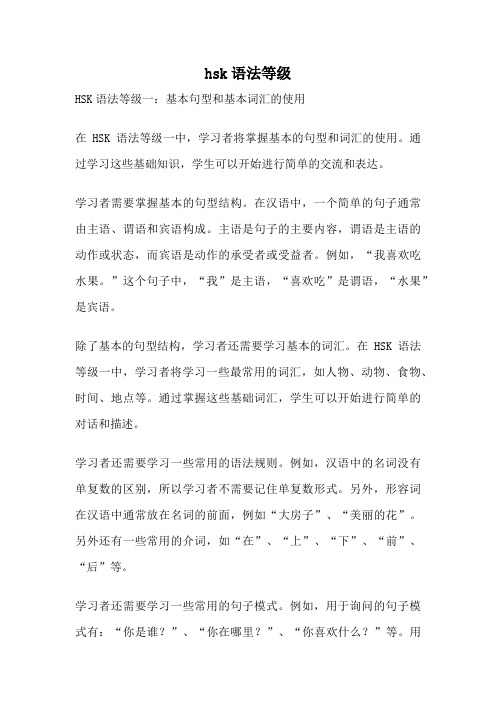
hsk语法等级HSK语法等级一:基本句型和基本词汇的使用在HSK语法等级一中,学习者将掌握基本的句型和词汇的使用。
通过学习这些基础知识,学生可以开始进行简单的交流和表达。
学习者需要掌握基本的句型结构。
在汉语中,一个简单的句子通常由主语、谓语和宾语构成。
主语是句子的主要内容,谓语是主语的动作或状态,而宾语是动作的承受者或受益者。
例如,“我喜欢吃水果。
”这个句子中,“我”是主语,“喜欢吃”是谓语,“水果”是宾语。
除了基本的句型结构,学习者还需要学习基本的词汇。
在HSK语法等级一中,学习者将学习一些最常用的词汇,如人物、动物、食物、时间、地点等。
通过掌握这些基础词汇,学生可以开始进行简单的对话和描述。
学习者还需要学习一些常用的语法规则。
例如,汉语中的名词没有单复数的区别,所以学习者不需要记住单复数形式。
另外,形容词在汉语中通常放在名词的前面,例如“大房子”、“美丽的花”。
另外还有一些常用的介词,如“在”、“上”、“下”、“前”、“后”等。
学习者还需要学习一些常用的句子模式。
例如,用于询问的句子模式有:“你是谁?”、“你在哪里?”、“你喜欢什么?”等。
用于表达喜好的句子模式有:“我喜欢……”、“我不喜欢……”等。
学习者还需要学习如何使用时间词和地点词,以便能够准确地表达时间和地点。
在HSK语法等级一中,学习者将学习基本的句型和词汇的使用。
通过掌握这些基础知识,学生可以开始进行简单的交流和表达。
在学习的过程中,学生需要不断练习,积累更多的词汇和句子模式,以提高自己的语言能力。
希望学习者能够通过努力学习,达到HSK语法等级一的要求,并在日常生活中能够流利地使用汉语进行交流。
汉办-HSK 1-6语法点
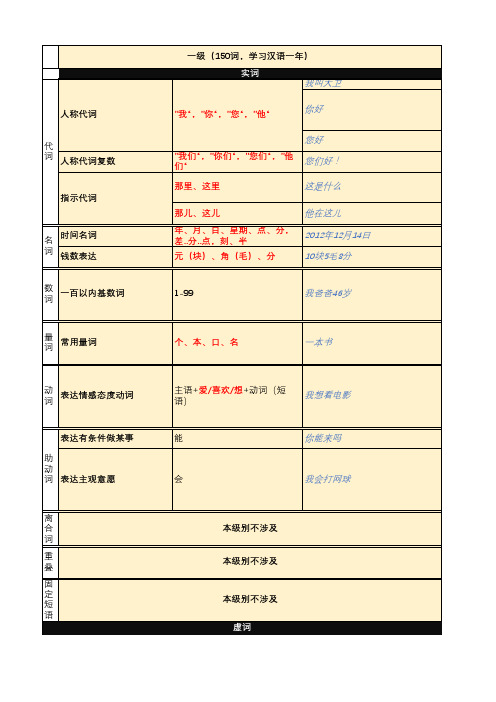
您好 您们好!
那里、这里
这是什么
那儿、这儿
他在这儿
年、月、日、星期、点、分, 差..分..点,刻、半
2012年12月14日
元(块)、角(毛)、分
10块5毛8分
1-99
我爸爸46岁
个、本、口、名
一本书
主语+爱/喜欢/想+动词(短 语)
我想看电影
能
你能来吗
会
我会打网球
本级别不涉及 本级别不涉及 本级别不涉及
虚词
程度副词:很、非常、真 很/非常/真+形容词(短语)
程度副词:太 副词:也
太+形容词(短语) 太+形容词(短语)+了
主语+也+动词(短语)
副 词
非常美丽
这本书太贵 太好了 我也去
副词:都
主语+都+动词(短语)
他们都来
连 词
连词:和
结构助词:的
助 词
语气助词:了
A+和+B 代词/名词+的+名词
小句+了
这是什么?
她是谁?
课室在哪? 今天几号? 你多大? 你怎么了? 这本书怎么样?
复 句
本级别不涉及
二级(300词,学习汉语一到两年)
大家
实词
大家好
每
代 词
我每天5点起床
指示代词+量词
这里/那里+量词+名词
这本书,那个人
名 方位名词 词 复合方位名词
方位名词短语
上、下、左、右、前、后
上边,左边 名词+方位名词
书在桌上
商店在我左边 商店左边
新汉语水平考试大纲(一级)语言功能+语法190410
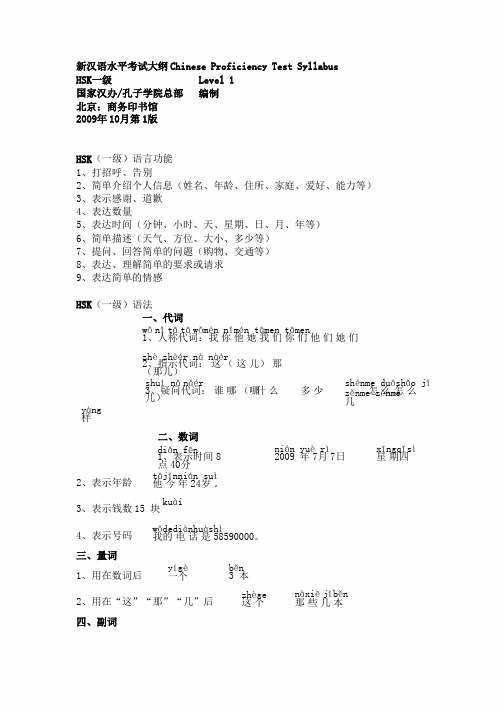
wǒzhùzàiběijīng 我住在北京。
2、语 气助 词: 呢 了
九、叹词 喂wèi nǐho 吗 喂 ,你 好 。十、陈述句 1、肯定句 2、否定句 不 没 十一、疑问句 1、吗 zhèshìnǐdezhuōzǐma 这 是 你的 桌 子吗? tābùzàifàndiàn 她不 在 饭 店 。 tāméiqùkàndiànyǐng 她没去看电影。
2、用在“这”“那”“几”后 四、副词
1、否定副词:不 没 2、程 度副 词: 很 3、范围副词:都 太 五、连词 和 六、介 词 wǒhénǐ 我和你
wǒbùshìxuéshēng 我不 是 学 生 。
tāméiqùyīyuàn 他 没 去医 院 。 tāhěngāoxìng 她很高兴。 tàihǎole 太 好 了! wǒméndōukànjiànnàgèrénle 我 们 都 看 见 那个 人 了。
十二、祈使句 qǐngzuò 请 请坐。 十三、感叹句 tàihǎole 太 太 好 了! 十四、特殊句型 1、“是”字句 2、“有”字句 3、“是……的”句 强调时间 强调地点 强调方式 十五、动作的状态 用“在……呢”表示动作正在进行 tāmenzàichīfànne 他 们 在 吃 饭 呢。 wǒshìzuótiānláide 我 是 昨 天 来 的。 zhèshìzàihuǒchēzhànmǎide 这 是 在 火 车 站 买 的。 tāshìwǒdetóngxué 他 是 我的 同 学 。 yìniányǒu gèyuè 一 年 有 12个 月 。
新汉语水平考试大纲 Chinese Proficiency Test Syllabus HSK一级 Level 1 国家汉办/孔子学院总部 编制 北京:商务印书馆 2009年 10月第 1版
hsk语法精讲精练

hsk语法精讲精练HSK语法精讲精练一、HSK简介HSK,即汉语水平考试(Hànyǔ Shuǐpíng Kǎoshì),是中国对外汉语教育的国家性标准化考试。
它主要考察考生的汉语水平,包括听、说、读、写四个方面。
HSK考试分为六个级别,从HSK1级到HSK6级逐渐提高。
二、HSK语法精讲1. 语序汉语的语序是主谓宾结构,即主语+谓语+宾语。
在汉语中,主语和谓语的位置是固定的,而宾语的位置可以灵活调整。
例如:“我喜欢吃水果。
”,“吃水果,我喜欢。
”这两个句子的意思是一样的,只是宾语的位置发生了变化。
2. 时态汉语的时态有现在时、过去时和将来时。
现在时表示现在正在进行的动作或状态,过去时表示过去发生的动作或状态,将来时表示将来要发生的动作或状态。
例如:“我现在在学习汉语。
”,“昨天我去了北京。
”,“明天我要去上海。
”3. 动词的使用在汉语中,动词的使用非常灵活,一个动词可以表示多种不同的意思。
例如:“看”这个动词可以表示看电影、看书、看朋友等不同的动作。
4. 量词在汉语中,名词前面通常要加上一个量词才能完整表达。
量词可以表示数量、单位或形状等。
例如:“一本书”、“两个苹果”。
5. 介词汉语中的介词用来表示名词与名词、名词与动词之间的关系。
常见的介词有“在、上、下、里、外、前、后”等。
例如:“我在教室里学习。
”,“书放在桌子上。
”三、HSK语法精练1. 完成下列句子。
- 你昨天去哪儿了?- 我昨天去了超市买东西。
- 你喜欢什么颜色的衣服?- 我喜欢穿黑色的衣服。
- 你家有几口人?- 我家有四口人。
2. 选择正确的词语填空。
- 我们______每天都要去上课。
(A. 通常 B. 昨天 C. 每天)- 他______要学习汉语。
(A. 现在 B. 昨天 C. 将来)- 你______喜欢吃什么水果?(A. 现在 B. 昨天 C. 将来)3. 根据图片选择正确的量词。
- 一______书 (A. 本 B. 个 C. 条)- 两______苹果 (A. 个 B. 本 C. 条)4. 将下列句子按正确的顺序排列。
1级_新hsk考语法大纲-hsk_level_1_grammar_points
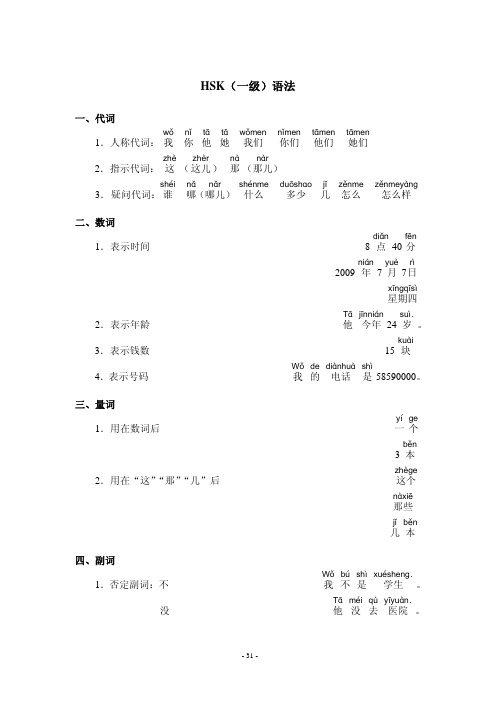
wǒ hé nǐ
我 和你
Wǒ zhù zài Běijīng.
我 住 在 北京 。
Wǒ huì zuò fàn.
我 会 做 饭。
Nǐ shénme shíhou néng lái?
你 什么 时候 能 来 ?
wǒ de diànnǎo
我 的 电脑
Tā qù yīyuàn le.
Zhè shì nǐ de zhuōzi ma?
这 是 你 的 桌子 吗 ?
Wǒ shì lǎoshī, nǐ ne?
我 是 老师 , 你 呢 ?
Nàge rén shì shéi?
那个 人 是 谁 ?
Zhèxiē bēizi, nǐ xǐhuan nǎ yí ge?
这些 杯子 , 你 喜欢 哪 一 个 ?
- 32 -
2.否定句 不 没
十一、疑问句 1.吗 呢 2.谁 哪 哪儿 什么 多少 几 怎么 怎么样
十二、祈使句 请
十三、感叹句 太
十四、特殊句型 1.“是”字句 2.“有”字句
Tā bú zài fàndiàn.
她 不 在 饭店 。
Tā méi qù kàn diànyǐng.
她 没 去 看 电影 。
她 去 医院 了 。
Tā shì yīshēng ma?
他 是 医生 吗 ?
Nǐ zài nǎr ne?
你 在 哪儿 呢 ?
Wéi nǐ hǎo
喂 ,你 好 。
Míngtiān xīngqīliù.
明天 星期六 。
Wǒ rènshi tā.
我 认识 他 。
Tiānqì hěn hǎo.
天气 很 好 。
最新新汉语水平考试HSK(一级)词汇-共150-个
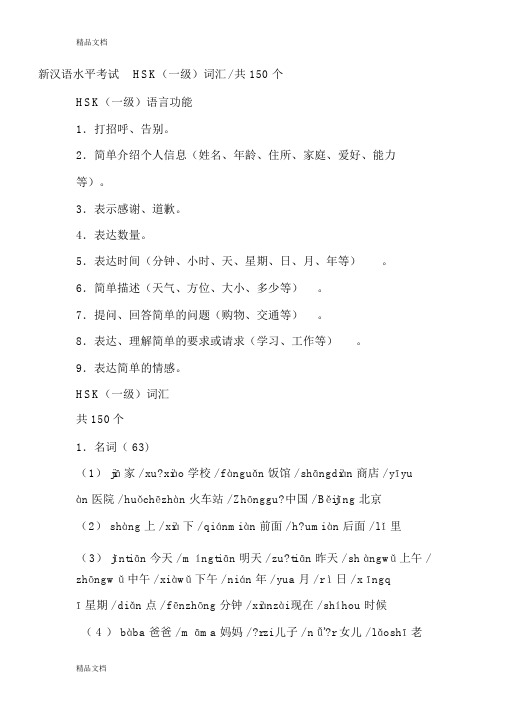
新汉语水平考试HSK(一级)词汇/ 共 150 个HSK(一级)语言功能1.打招呼、告别。
2.简单介绍个人信息(姓名、年龄、住所、家庭、爱好、能力等)。
3.表示感谢、道歉。
4.表达数量。
5.表达时间(分钟、小时、天、星期、日、月、年等)。
6.简单描述(天气、方位、大小、多少等)。
7.提问、回答简单的问题(购物、交通等)。
8.表达、理解简单的要求或请求(学习、工作等)。
9.表达简单的情感。
HSK(一级)词汇共 150个1.名词( 63)(1) jiā家 / xu?xiào 学校 / f ànguǎn 饭馆 / shāngdiàn 商店 / yīyuàn 医院 / huǒchēzhàn 火车站 / Zhōnggu?中国 / Běijīng 北京(2) shàng 上 / xià下 / qi ánmi àn 前面 / h?umi àn 后面 / l ǐ里(3) jīnti ān 今天 / m íngti ān 明天 / zu?ti ān 昨天 / sh àngwǔ上午 / zhōngw ǔ中午 / xi àwǔ下午 / ni án 年 / yua 月 / r ì日 / x īngqī星期 / di ǎn 点 / f ēnzhōng 分钟 / xiànzài 现在 / shíhou 时候( 4 ) bàba 爸爸 / m āma 妈妈 / ?rzi 儿子 / n ǚ'?r 女儿 / l ǎoshī老师 / xu?sheng 学生 / t?ngxu? 同学 / p?ngyou 朋友 / y īshēng 医生 / xiānsheng 先生 / xiǎoji ě小姐(5)yīfu 衣服 / shuǐ水 / cài 菜 / m ǐfàn 米饭 / shuǐguǒ水果 / píngguǒ苹果 / ch á茶 / b ēizi 杯子 / qi án 钱 / f ēij ī飞机 / ch ūzūch ē出租车 / di ànshì电视 / di ànnǎo 电脑 / di ànyǐng 电影 /tiānqì天气 / m āo 猫 / gǒu 狗 / d ōngxi 东西(6)r?n 人 / m íngzi 名字 / shū书 / Hànyǔ汉语 / zì字 / zhuōzi 桌子 / yǐzi 椅子2.动词( 36)(1) xiaxie 谢谢 / b ú不 / kaqi 客气 / zàiji àn 再见 / q ǐng 请 / du ìbuqǐ对不起 / m?i guānxi 没关系(2)shì是 / yǒu 有(3) kàn 看 / t īng 听 / shuōhuà说话 / d ú读 / xiě写 / kànjiàn 看见/ ji ào 叫 / l ái 来 / hu í回 / q ù去 / ch ī吃 / h ē喝 / shuìji ào 睡觉 / d ǎdiànhu à打电话 / zu?做 / m ǎi 买 / kāi 开 /zu?坐 / zhù住 / xu?xí学习 / gōngzu?工作 / xià下雨(4)ài 爱 / xǐhuan 喜欢 / xiǎng 想 / ranshi 认识(5)huì会 / n?ng 能3.形容词( 9)hǎo 好 / d à大 / xiǎo 小 / du ō多 / shǎo 少 / l ěng / 冷 / ra 热 / gāoxìng 高兴 / pi àoliang 漂亮4.代词( 14)wǒ我 / n ǐ你 / t ā他 / t ā她 / w ǒmen 我们 / zha 这( zhar 这儿) / n à那( nàr 那儿) / n ǎ哪( nǎr 哪儿) / sh?i 谁 / sh?nme 什么 / du ōshao 多少 / j ǐ几 / zěnme 怎么 / zěnmeyàng 怎么样5.数词( 11)yī一 / ar 二 / s ān 三 / sì四 / w ǔ五 / li ù六 / q ī七 / b ā八 / ji ǔ九 / shí十 / l íng 零6.量词( 5)ga 个 / suì岁 / b ěn 本 / xiē些 / ku ài块7.副词( 5)bù不 / m?i 没 / hěn 很 / t ài 太 / d ōu 都8.连词( 1) h? 和9.介词( 1) zài在10.助词( 4)de 的 / le 了 / ma 吗 / ne 呢11.叹词( 1)wai 喂按音序排A1.ài爱B2.bā八3.bàba 爸爸4.bēizi 杯子5.Běijīng 北京6.běn 本7.búkaqi 不客气8.bù不C9.cài 菜10. chá茶11. chī吃12. chūzūchē出租车D13. dǎdiànhuà打电话14. dà大15. de 的16. diǎn 点17. diànnǎo 电脑18. diànshì电视19. diànyǐng 电影20. dōngxi 东西21. dōu 都22. dú读23. duìbuqǐ对不起25. duōshao 多少E26. ?rzi 儿子27. ar 二F28. fànguǎn 饭馆29. fēijī飞机30. fēnzhōng 分钟G31. gāoxìng 高兴32. ga 个33. gōngzu?工作34. gǒu 狗H35. Hànyǔ汉语36. hǎo 好37. hē喝38. h? 和39. hěn 很40. h?umiàn 后面41. huí回43. huǒchēzhàn 火车站J44. jǐ几45. jiā家46. jiào 叫47. jīnti ān 今天48. jiǔ九K49. kāi开 50. kàn 看51. kànji àn 看见52. kuài 块L53. lái 来54. lǎoshī老师55. le 了56. lěng 冷57. lǐ里58. líng 零59. liù六M60. māma 妈妈61. ma 吗62. mǎi买63. māo 猫64. m?i 没65. m?i guānxi 没关系66. mǐfàn 米饭67. míngtiān 明天68. míngzi 名字N69. nǎ哪( nǎr 哪儿)70. nà那( nàr 那儿)71. ne 呢72. n?ng 能73. nǐ你74. nián 年75. nǚ'?r 女儿P76. p?ngyou 朋友77. piàoliang 漂亮78. píngguǒ苹果Q79. qī七80. qián 钱81. qiánmiàn 前面82. qǐng 请83. qù去R84. ra 热85. r?n 人86. ranshi 认识87. rì日S88. sān 三89. shāngdiàn 商店90. shàng 上91. shàngwǔ上午92. shǎo 少93. sh?i 谁94. sh?nme 什么95. shí十96. shíhou 时候97. shì是98. shū书99. shuǐ水100.shuǐguǒ水果101.shuìjiào 睡觉102.shuōhuà说话103.sì四104.suì岁T105.t ā他106.t ā她107.t ài 太108.ti ānqì天气109.t īng 听110.t?ngxu? 同学W111.wai 喂112.wǒ我113.wǒmen 我们114.wǔ五X115.xǐhuan 喜欢116.xià下117.xiàwǔ下午118.xiàyǔ下雨119.xiānsheng 先生120.xiànzài 现在121.xiǎng 想122.xiǎo 小123.xiǎoji ě小姐124.xiē些125.xiě写126.xiaxie 谢谢127.xīngqī星期128.xu?sheng 学生129.xu?xí学习130.xu?xiào 学校Y131.yī一132.yīfu 衣服133.yīshēng 医生134.yīyuàn 医院135.yǐzi 椅子136.yǒu 有137.yua 月Z138.zài 在139.zàiji àn 再见140.zěnme 怎么141.zěnmeyàng 怎么样142.zha 这( zhar 这儿)143.Zhōnggu?中国144.zhōngwǔ中午145.zhù住146.zhuōzi 桌子147.zì字148.zu?ti ān 昨天149.zu?坐150.zu?做HSK(一级)语法一、代词1.人称代词: wǒ我 / n ǐ你 / t ā他 / t ā她 / w ǒmen 我们 / n ǐ men 你们 / t āmen 他们 / t āmen 她们2.指示代词:zha 这( zhar 这儿) / n à那( nàr 那儿)3.疑问代词: sh?i 谁 / n ǎ哪(nǎr 哪儿) / sh?nme 什么 / duōshao 多少 / j ǐ几 / zěnme 怎么 / zěnmeyàng 怎么样二、数词1.表示时间 8 diǎn 40 fēn- 8 点 40 分2009 nián 7 yua 7 rì2009 年 7 月 7 日xīngqīsì星期四2.表示年龄 Tājīnnián 24 suì- 他 24 今年岁。
HSK标准汉语1教学大纲
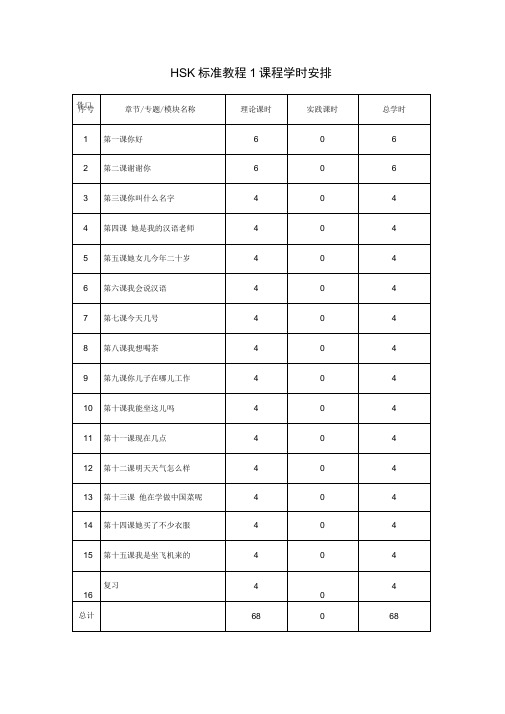
HSK标准教程1课程学时安排教学内容和教学目标第1 课你好【重点句型】学生能够了解并掌握1 、你好!您好!你们好!2 、对不起!没关系!【语音】学生能够:1、熟练朗读本课的14 个声母、18 个韵母2、熟悉并正确朗读汉语的四个声调3、了解汉语音节的声韵调拼合关系4、熟悉并正确朗读两个三声音节的连续变调【汉字】学生能够:1、熟练认读本课生词2、掌握“一、丨、丿、丶、乀”五种笔画的正确写法3、独立书写独体字“一、二、三、十、八、六”【功能】学生能够1、打招呼、问候2、致歉3、表达原谅第二课谢谢你【重点句型】学生能够了解并掌握:1. 谢谢!2. 谢谢!不客气!3. 再见!【语音】学生能够:1. 熟练朗读本课的7 个声母、18 个韵母2. 熟悉含有轻声音节的双音节词语的声调模式3. 熟悉拼音规则的标调法和省写规则【汉字】学生能够:1. 熟练认读本课生词2. 掌握“ 、、”三种笔画的正确写法3. 独立书写独体字“口、见、山、小、不”功能】学生能够:1. 表达感谢2. 告别第三课你叫什么名字【重点句型】学生能够熟练掌握“叫、名字、老师、学生、人”的词义和用法【语言点】学生能够了解并掌握:1、疑问代词“什么”2、“是”字句3、用“吗”的疑问句【语音】学生能够:1、熟悉声母j、q、x和z、c、s的发音区别并能正确发音2、熟悉韵母i、u、0的发音区别并能正确发音3、熟悉并掌握“不”的变调4、熟悉单韵母0和0开头的韵母跟j、q、x相拼的规则汉字】学生能够:1、熟练认读本课生词2、掌握“、”两种笔画的正确写法3、独立书写独体字“月、心、中、人”4、了解“先横后竖、先撇后捺”的笔顺规则【功能】学生能够:1、询问和回答问题2、询问和回答职业、国籍3、介绍他人的姓名、职业、国籍第四课她是我的汉语老师【重点词语】学生能够熟练掌握“她、他、汉语、国、哪、同学、朋友”的词义和用法【语言点】学生能够了解并掌握:1、疑问代词“谁”、“哪”2、结构助词“的”3、疑问助词“呢”【语音】学生能够:1、熟悉声母zh 、ch、sh 、r 的发音区别并能正确发音2、熟悉前鼻音韵母n 和后鼻音韵母ng 的发音区别并能正确发音3、熟悉并掌握“一”的变调4、熟悉y、w 的用法【汉字】学生能够:1、熟练认读本课生词2、掌握“、”两种笔画的正确写法3、独立书写独体字“七、儿、几、九”4、了解“从上到下、从左到右”的笔顺规矩【功能】学生能够:1、询问和回答某人是谁2、表达人或者事物的所属关系3、承接上文简短提问第五课他女儿今年二十岁重点词语】学生能够熟练掌握“家、有、口、女儿、岁、今年”的词义和用法【语言点】学生能够了解并掌握:1、疑问代词“几”2、百以内的数字3、“了”表示变化4 、“多+ 大”表示疑问【语音】学生能够:1、掌握儿化的发音2、熟悉以i、u、0开头的韵母的发音并能正确发音3、熟悉声母送气音和不送气音的发音并能正确发音4、熟悉隔音符号的用法【汉字】学生能够:1、熟练认读本课生词2、掌握“ 、”两种笔画的正确写法3、独立书写独体字“水、女、了、大”4、了解“先外后内、先中间后两边”的笔顺规则功能】学生能够:1、询问和回答关于年龄的问题2、表达百以内的数字第六课我会说汉语【重点词语】学生能够熟练掌握“说、菜、好吃、做、写、汉字、字、读”的词义和用法【语言点】学生能够了解并掌握:1、能愿动词“会” 1 表示通过学习获得某种能力2、形容词谓语句3、疑问代词“怎么” 1 用于询问动作的方式【语音】学生熟悉双音节词语的一声音节和各声调搭配的声调模式,并能正确朗读【汉字】学生能够:1、熟练认读本课生词3、独立书写独体字“东、我、西”4、了解汉字的独体结构和合体结构【功能】学生能够:1、表达通过学习而获得的某种能力2、表达人或者事物的性质或者状态3、询问动作行为进行的方式第七课今天几号【重点词语】学生能够熟练掌握“今天、月、星期、去、看、书”的词义和用法【语言点】学生能够了解并掌握:1 、日期的表达1 :月、日/ 号、星期2、名词谓语句3、连动句1:去+地方+做什么【语音】学生熟悉双音节词语的二声音节和各声调搭配的声调模式,并能正确朗读汉字】学生能够:1、熟练认读本课生词2、独立书写独体字“四、五、书”3、了解汉字的左右结构与左中右结构4 、了解“ (三点水)、(言字旁)”所表示的意思【功能】学生能够:1、表达时间:月、日/ 号、星期2、表达动作行为的目的第八课我想喝茶【重点词语】学生能够熟练掌握“吃、喝、下午、商店、买、这、那”的词义和用法【语言点】学生能够了解并掌握:1、能愿动词“想”2、疑问代词“多少”3、量词“个”“口”4、钱数的表达:••• •块•元【语音】学生熟悉双音节词语的三声音节和各声调搭配的声调模式,并能正确朗读【汉字】学生能够:1、熟练认读本课生词2、独立书写独体字“少”“个”3、了解汉字的上下结构和上中下结构4、了解“ (金字旁)”、“ (口字旁)”所表示的意思【功能】学生能够:1、表达意愿或者愿望2、询问和回答钱数3、正确使用量词“个”“口”第九课你儿子在哪工作【重点词语】学生能够熟练掌握“小、那儿、椅子、下面、工作、儿子、医院、医生、爸爸”的词义和用法语言点】学生能够了解并掌握:1、动词“在”2、疑问代词“哪儿”3、介词“在”4、疑问助词“呢” 2 用于询问人或事物的位置【语音】学生熟悉双音节词语的四声音节和各声调搭配的声调模式,并能正确朗读【汉字】学生能够:1、熟练认读本课生词2、独立书写独体字“在、子、工”3、了解汉字的半包围结构4、了解“ (走之旁)”、“ (门字框)”所表示的意思【功能】学生能够:1、询问和表达人或者事物所处的位置2、询问和表达动作行为发生的位置和场所3、正确使用疑问助词“呢”询问人或事物所处的位置第十课我能坐这儿吗重点词语】学生能够熟练掌握“电脑、本、里、前面、后面、这儿、没有、坐”的词义和用法【语言点】1、“有”字句:表示存在2、连词“和”3、能愿动词“能”4、用“请”的祈使句【语音】学生能够:1 、熟悉含有轻声音节的双音节词语的声调模式2、正确朗读叠音词3、正确朗读带后缀的词语【汉字】学生能够:1、熟练认读本课生词2、独立书写独体字“上、下、本、末”3、了解汉字的全包围结构4、了解“ (国字框)示字旁)”所表示的意思1、询问和表达某个处所存在什么人或者事物2 、表达几个并列关系的人或者事物3、委婉地表达请求或者询问许可第十一课现在几点【重点词语】学生能够熟练掌握“中午、吃饭、时候、回、我们、电影、住”的词义和用法【语言点】学生能够了解并掌握:1、时间的表达:........... 点............. 分2、时间词作状语3、名词“前”:表示现在或者所说的某个时间以前的时间【语音】学生能够理解汉语轻声的功能,理解有无轻声音节时词义的区别,并能正确朗读【汉字】学生能够:1 、熟练认读本课生词2、独立书写独体字:“午、电”3、了解“ (耳刀旁)”、“ (单人旁)”所表示的意思【功能】学生能够:1、询问具体的时间点2、询问和回答某个动作行为发生的时间3、描述现在或者所说的某个时间以前的时间第十二课明天天气怎么样【重点词语】学生能够熟练掌握“天气、热、冷、下雨、来、身体、爱、些、水果、水”的词义和用法【语言点】学生能够了解并掌握:1、疑问代词“怎么样”2、主谓谓语句3、程度副词“太”4、能愿动词“会” 2:表示所说的情况有可能实现【语音】学生熟悉一声音节开头的三音节词语的声调模式,并能正确朗读【汉字】学生能够:1、熟练认读本课生词2、独立书写独体字“天、气、雨”3、了解“ (女字旁)”、“ (食字旁)”所表示的意思【功能】学生能够:1、询问和回答人或者事物的性质状态2、询问和描述人或者事物某一方面的情况3、表达程度较深的意义4、表达所说的情况有可能实现第十三课他在学做中国菜呢【重点词语】学生能够熟练掌握“学习、上午、睡觉、电视、喜欢、打电话、也”的词义和用法【语言点】学生能够了解并掌握:1、叹词“喂”2、“在呢”表示动作正在进行3、电话号码的表达4、语气助词“吧”:用在祈使句末尾,委婉表达建议或者命令【语音】学生熟悉二声音节开头的三音节词语的声调模式,并能正确朗读【汉字】学生能够:1、熟练认读本课生词2、独立书写独体字“日、目、习”3、了解“ (日字旁)”、“ (目字旁)”所表示的意思【功能】学生能够:1、询问和简单描述某人什么时间在做什么2 、询问和回答电话号码3、委婉的表达建议或命令第十四课她买了不少衣服【重点词语】学生能够熟练掌握“东西、一点儿、开、回来、漂亮、少、这些”的词义和用法语言点】学生能够了解并掌握:1、“了”表示发生或完成2、名词“后”:表示现在或者所说的某个时间以后的时间3、语气助词“啊”4、副词“都”【语音】学生熟悉三声音节开头的三音节词语的声调模式,并能正确朗读【汉字】学生能够:1、熟练认读本课生词2、独立书写独体字:开、车、回3、了解“ (肉月旁)”、“ (提手旁)”所表示的意思【功能】学生能够熟练:1、询问和回答已经完成或发生的时间2、描述现在或者所说的某个时间以后的时间3、表达感叹的语气4、表达全部、总括的意义。
少儿HSK一级语法大纲
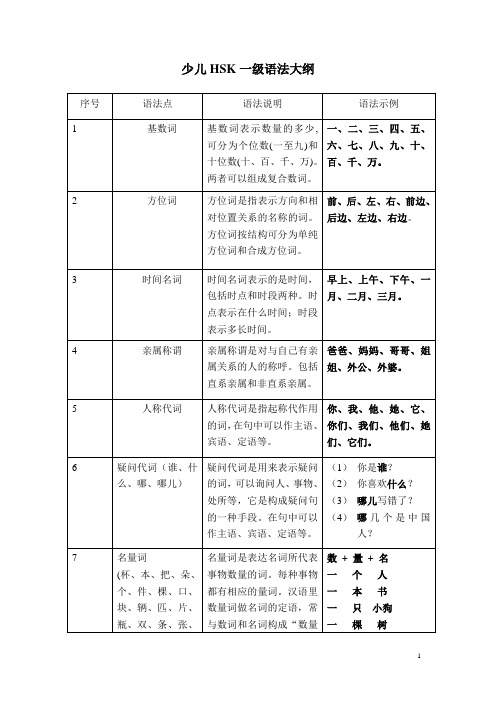
(2)我的手机能用了。
(3)他会说三种外语。
(4)这个孩子很会说话。
22
介词“从”
介词“从”加上处所词放在谓语动词前面,表示动作行为的起点或动作通过的场所。
(1)露西从澳大利亚来到中国。
(2)我每天从家里坐车到学校。
(3)你从哪儿来?
23
连词“和”
“和”连接词或短语,表示并列关系。
名量词是表达名词所代表事物数量的词。每种事物都有相应的量词。汉语里数量词做名词的定语,常与数词和名词构成“数量名”结构。结构形式为:数+量+名。
数+量+名
一个人
一本书
一只小狗
一棵树
8
疑问代词(几、多少)
“几”和“多少”用来询数量,“几”用来问“一”至“十”之间的数字,而“多少”可以问任何一个数字。
(1)一个星期有几天?
(2)你家有几口人?
(3)桌上有多少个苹果?
9
一点儿
“一点儿”用在形容词和动词后面,表示较低的程度。结构形式为:形容词+一点儿。
(1)今天比昨天冷一点儿。
(2)你走近一点儿,我看不清楚。
(3)你快点儿,要迟到了。
10
年、月、日的基本表达法
年、月、日表示具体时间时,年放在前面,月放在中间,日放在最后,用阿拉伯数字表示。结构形式为:(数字)年+(数字)月+(数字)日。
(1)爸爸、妈妈和我都喜欢运动。
(2)姐姐和我都在中国长大。
(3)他爱吃草莓和橙子。
24
副词“很”
“很”放在形容词前面,说明形容词表示的状态程度很深。
(1)这个故事我很喜欢。
(2)他家的小狗很可爱。
课程标准HSK一级语法点

HSK 一级语法点一、疑问代词“什么”。
The Interrogative Pronoun “什么”。
疑问代词“什么”表示疑问,用在疑问句中可直接做宾语,或者与后者名词性成分一起做宾语.The interrogative pronoun “什么”is used in interrogative sentence,serving as the object by itself or together with a nominal element following it.For example(1)你叫什么名字.(2)这(zhè,this)是什么?(3)这(zhè,this)是什么(shū,book)?二、“是”字句。
The“是”Sentence。
“是”字句是由“是"构成的判断句,由于表达人或事物等于什么或者属于什么,其否定形式是在“是"前加上否定副词“不”.例如:A “是”sentence is a determinative sentence with is “是”,indicating what somebody or something equals or belong to。
The negative sentence is formed by adding the negative adverb “不"before “是”。
For example三、用“吗”疑问句.Interrogative Sentence with“吗”疑问助词“吗”,表示疑问语气,用在陈述句句尾构成疑问句。
例如:The particle “吗”indicate an interrogative mood.When “吗”is added at the end of a declarative sentence,the declarative sentence turn into a question。
新hsk语法(资料整合)

HSK(一级)词150个,字174个HSK(二级)词300个,字347个,新增字173个HSK(三级)词600个,字617个,新增字270个HSK(四级)词1200个,字1064个,新增字447个HSK(五级)词2500个,字1685个,新增字621个HSK(六级)词5000个,字2663个,新增字978个新HSK语法要点(一)----代词第一讲代词指代替名词、动词、形容词、数词或副词的词,它包括人称代词、指示代词和疑问代词。
一、人称代词指代人的词叫人称代词,主要有:单数是我、你、他、她、它,复数是我们、你们、他们、她们、它们、咱们,另外还有自己、人家、彼此等等。
1. 我们、咱们“我们”可以是包括式,也可以是排除式,“咱们”是包括式。
比如:你放心走吧,过几天我们就给你打电话。
(排除式)。
咱们确定一下旅行的路线。
2. 人家1)泛指第三人称,可以和“别人”换用。
比如:我听人家/别人说你换大学了,是吗?2)确指第三人称,有时可与指人的名词(短语)连用。
比如:五班的同学都很努力,我们应该想人家学习。
(确指五班的同学)3)指说话人自己。
比如:你不来帮我,还站在那儿笑话人家,真讨厌!二、指示代词指示的意思是利用说话时的环境直说谈论的人或者事物,而不是用人、事物的名称。
用来指示人、事物的代词叫指示代词。
常用的有:近指远指这/这些那/那些——指代人或事物这儿/这里那儿/那里——指代处所这样/这么那样/那么——指代性状和方式这么样那么样——指代程度这会儿那会儿——指代时间另外,指示代词还有“每”、“各”等。
1、这会儿、那会儿、多会儿1)这会儿:这个时候,指“现在”或“当前”。
2)那会儿:那个时候,指过去或将来。
3)多会儿:什么时候。
比如:早晨有点儿不舒服,这会儿好多了。
我上大学那会儿特别瘦。
这是多会儿的晚报?2、这么、那么1)“这么”、“那么”用在形容词或表示心理活动的动词前,表示程度。
比如:哈尔滨的夏天没有南京那么热。
hsk汉语水平考试语法等级表

HSK汉语水平考试分为HSK一级(初级)、HSK二级(初级)、HSK三级(初级)、HSK四级(中级)和HSK五级(高级)。
以下是每个级别的语法等级表:
HSK一级(初级):掌握基本的疑问句、肯定句、否定句等简单句型,能够理解基本的中文句子结构。
HSK二级(初级):掌握基本的名词、动词、形容词等词类,能够理解和运用较为复杂的中文句子结构,如并列句、复合句等。
HSK三级(初级):能够理解和运用更复杂的汉语语法结构,如动词的时态、语态等,以及较为复杂的复合句和段落结构。
HSK四级(中级):能够理解和运用更高级的汉语语法结构,如虚拟语气、被动语态等,同时能够理解较为复杂的段落和篇章结构。
HSK五级(高级):能够理解和运用汉语的各种复杂语法结构,包括一些特殊的表达方式和文化背景下的语言习惯,同时能够理解和运用较为复杂的段落和篇章结构。
hsk 1 2 语法点
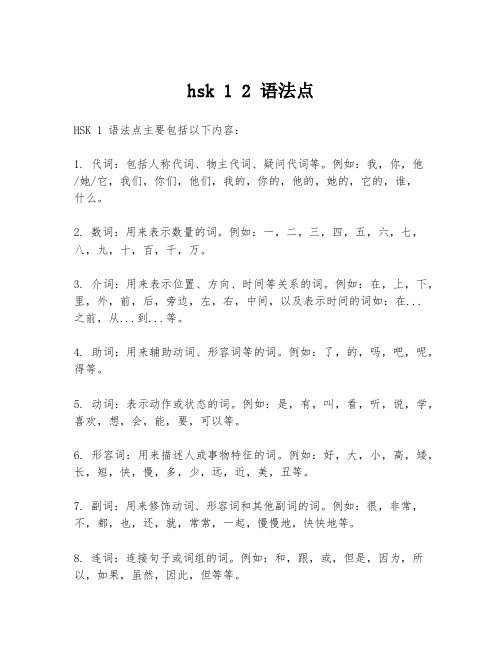
hsk 1 2 语法点
HSK 1 语法点主要包括以下内容:
1. 代词:包括人称代词、物主代词、疑问代词等。
例如:我,你,他
/她/它,我们,你们,他们,我的,你的,他的,她的,它的,谁,
什么。
2. 数词:用来表示数量的词。
例如:一,二,三,四,五,六,七,八,九,十,百,千,万。
3. 介词:用来表示位置、方向、时间等关系的词。
例如:在,上,下,里,外,前,后,旁边,左,右,中间,以及表示时间的词如:在...
之前,从...到...等。
4. 助词:用来辅助动词、形容词等的词。
例如:了,的,吗,吧,呢,得等。
5. 动词:表示动作或状态的词。
例如:是,有,叫,看,听,说,学,喜欢,想,会,能,要,可以等。
6. 形容词:用来描述人或事物特征的词。
例如:好,大,小,高,矮,长,短,快,慢,多,少,远,近,美,丑等。
7. 副词:用来修饰动词、形容词和其他副词的词。
例如:很,非常,不,都,也,还,就,常常,一起,慢慢地,快快地等。
8. 连词:连接句子或词组的词。
例如:和,跟,或,但是,因为,所以,如果,虽然,因此,但等等。
以上是HSK 1的一些基础语法点,能够帮助学习者构建基础句子和进行简单的交流。
- 1、下载文档前请自行甄别文档内容的完整性,平台不提供额外的编辑、内容补充、找答案等附加服务。
- 2、"仅部分预览"的文档,不可在线预览部分如存在完整性等问题,可反馈申请退款(可完整预览的文档不适用该条件!)。
- 3、如文档侵犯您的权益,请联系客服反馈,我们会尽快为您处理(人工客服工作时间:9:00-18:30)。
HSK 一级语法点一、疑问代词“什么”。
The Interrogative Pronoun “什么”。
疑问代词“什么”表示疑问,用在疑问句中可直接做宾语,或者与后者名词性成分一起做宾语。
The interrogative pronoun “什么”is used in interrogative sentence,serving as the object by itself or together with a nominal element following example(1)你叫什么名字。
(2)这(zhè,this)是什么(3)这(zhè,this)是什么(shū,book)二、“是”字句。
The“是”Sentence。
“是”字句是由“是”构成的判断句,由于表达人或事物等于什么或者属于什么,其否定形式是在“是”前加上否定副词“不”。
例如:A “是”sentence is a determinative sentence with is “是”,indicating what somebody or something equals or belong to。
The negative sentence is formed by adding the negative adverb “不”before “是”。
For example三、用“吗”疑问句。
Interrogative Sentence with“吗”疑问助词“吗”,表示疑问语气,用在陈述句句尾构成疑问句。
例如:The particle “吗”indicate an interrogative mood。
When “吗”is added at the end of a declarative sentence,the declarative sentence turn into a question。
For example:四、疑问代词“谁”、“哪”The Interrogative Pronouns “谁”and“哪”(一)、疑问代词“谁”在疑问句中用来询问人。
例如:The interrogative pronoun “谁” is used to ask about the name or identity of a person。
For example:(二)、如When the interrogative pronoun “哪” is used in a question ,the structure is “哪 +measure word /noun+noun ”For example :(1)哪本(běn,a measure word for books)书(shū,book)(2)哪个(gè,a general measure word )人(3)你是哪国人五、结构助词“的” The structural particle“的”指人的名词时,“的”可以省略。
例如:The structure “noun/pronoun+的+noun”indicate the noun following “的”is a tern of kinship or indicate a person ,“的” can be omitted .For example :(1)李月是我的汉语老师。
(2)这(zhè,this)是我的书(shū,book)。
(3)她不是我同学,她是我朋友。
六、疑问助词“呢”(1)The Interrogative Particle“呢”(1)疑问助词“呢”用在名词后或代词后构成疑问句,用于询问上文提到的情况。
The Interrogative particle “呢”is used after a noun or pronoun,forming a question about the situation mentioned previously .The commonly used sentence pattern is “A.......。
B呢”(A......。
What about B).For example:(1)我不是老师,我是学生。
你呢(2)她叫李月,他呢(3)我是美国人。
你呢七、疑问代词“几” The Interrogative Pronoun “几”疑问代词“几”是用来询问数量的多少,一般用于询问10以下的数字。
例如:The interrogative pronoun“几”is used to ask about a number ,usually less than example(1)你有几个汉语老师(2)李老师家有几口人(3)你女儿几岁了八、百以内的数字Number below 100九、“了”表变化“了”Indicating a Change“了:用于句末,表示变化或新情况的出现。
例如:“了”is used at the end of a sentence to indicate a change or theoccurrence of a new situation .For example :(1)李老师今年50 岁了。
(2)我朋友的女儿今年四岁了。
(3)你女儿几岁了十、“多+大”表示疑问 The Interrogative Phrase“多+大”“多+大”在句子中表示疑问,用于询问年龄。
例如:“多+大”is used to ask about one’s example :(1)你多大了(2)你女儿今年多大了(3)李老师多大了十一、能愿动词“会”(1)The Modal Verb“会”(1)能愿动词“会”用在动词前表示通过学习而获得某种能力,它的否定形式是“不会”。
例如:The modal verb “会”is used before a verb,indicating acquiring ability through learning。
Its negative form is“不会”。
For example:十二、形容词谓语句 Sentence with an Adjectival Predicate形容词可以用在这个结构中,描述人或者事物的性质或者状态,程度副词经常用“很”。
否定形式为Used in the structure ”subject+adverb of degree +adjective”,the adjective describes the nature or state of somebody or something,usually following the adverb of degree “很”。
The negative form is“subject +不 +adjective”。
For example:十三、疑问代词“怎么”(1) The Interrogative Pronoun “怎么”(1)疑问代词“怎么”用在动词前,询问动作的方式。
例如The Interrogative pronoun“怎么”is used before a verb to ask about the manner of an action。
For example:(1)这个汉字怎么读(2)你的汉语名字怎么写(3)这个字怎么写十四、日期的表达(1):月、日(rì,date)/号、星期Express of a Date(1):month,date,day of the week汉语的日期表达方式遵循由大小的原则,先说“月”,然后说“日/号”,最后说“星期”。
口语一般常用“号”。
例如:The way to say a date in Chinese observed the principle of “the bigger unit coming before the smaller one “,The month is said first ,then the date and finally the day of the spoken Chinese ,“号”is often used instead of“日”to express the date .For example :(1)9月1号,星期三。
(2)9月2号,星期四。
(3)8月31号,星期二。
十五、名词谓语句是Sentence with a Nominal Predicate名词谓语句是谓语部分由名词性成分充当的句子,一般用于表达年龄、时间、日期等。
例如:A sentence with a nominal Predicate is a sentence whose Predicate is a nominal element。
It is usually used to indicate age,time,date and so on。
For example十六、连动句(1):去+地方+做什么Sentence with a Serial Verb Construction(1)去+place+to do sth 连动句的谓语部分是由两个或者两个以上动词构成,后一个动作可以表示前一个动作的目的。
第一个动词后表示地点的宾语有时可以省略。
例如:The predicate of a sentence with a serial verb construction consists of two or more verb .The latter verb can be the purpose of the former .The object of the first verb , place ,can sometime be example:十七、能愿动词“想”The Modal Verb “想”能愿动词“想”,一般用在动词前表示一种希望或者打算。
例如:The modal verb “想“is usually used before a verb to express a hope or plan .For example :(1)我想学汉语。
(2)明天我想去学校看书(3)我想买一个杯子。
十八、疑问代词”多少” The Interrogative Pronoun “多少”。
疑问代词“多少”用于询问十以上的数量,“多少”后边的量词可以省略。
“多少”还用于询问价格,常用于表达方式“...........多少钱”。
例如:The interrogative pronoun “多少”is used to ask about number larger than 10 .The measure word following can be omitted .”多少”can also be used to inquire about prices,usually in the sentence pattern“...........多少钱”。
